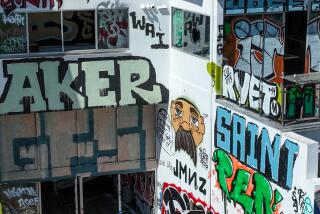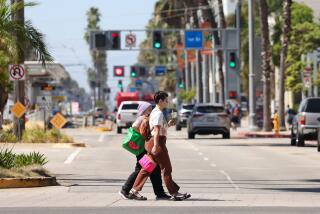City’s Anti-Graffiti Effort Being Boosted : Gangs: Hot line is part of Huntington Beach effort to quickly erase scrawls and drawings.
- Share via
HUNTINGTON BEACH — Surf City is cracking down on graffiti.
City government this week emphasized its concern about quickly erasing any graffiti that appear on public or private structures. Among new programs soon to start will be a hot line for people to phone in locations of new graffiti. City workers will then move quickly to erase the scrawls and drawings.
A program already in place removes graffiti from public property in 24 hours or less, according to the city’s Public Works Department.
City officials said the reason for increased scrutiny of graffiti is concern about growing gang problems in central Orange County. Huntington Beach wants to keep gangs from migrating to the coast and gaining a foothold in the city, officials said.
Public Works Director Louis Sandoval said signs are being prepared with number of the hot line. The new signs are expected to be posted, and the hot-line program launched, within the next month.
Another new program, begun on the beachfront Jan. 1, has helped to cut down on graffiti there, according to Naida Osline, the city’s cultural services supervisor.
That program allows people to paint on a mile-long section of beach retaining wall if they first obtain a free permit from the city. Osline said the program has proved to be popular and has reduced unwanted graffiti on retaining walls and nearby concrete steps at the beach.
Nonetheless, the beach area along Pacific Coast Highway is still the biggest target for graffiti in the city, Sandoval said. Another heavily hit area is Slater Avenue between Beach Boulevard and Gothard Street, he said.
Sandoval said graffiti in the city has increased tremendously in the past four years. In fiscal 1987-88, the city found graffiti on 274 structures, and the total removal cost was $15,651. So far this fiscal year, graffiti have been removed from 4,200 locations at a cost of $50,862.
Because graffiti claim territory and sometimes include encoded messages, “we always allow police to take photos of it before we remove it,” Sandoval said.
More to Read
Sign up for Essential California
The most important California stories and recommendations in your inbox every morning.
You may occasionally receive promotional content from the Los Angeles Times.










